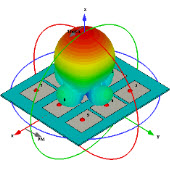a question of bit errors per day
12-13
A continuously operating coherent bpsk system makes errors at the average ra
te of 100 errors per day. The data rate is 1000bits/s. The single-sided nois
e powere spectral density is N_0=10^{-10}W/Hz
a) If the system is ergodic,what's the average bit error probability?
b) If the value of received average signal power is adjusted to be 10^{-6}W,
will this received power be adequate to maintain the error probability foun
d in part a)?
Solution:
a) P_{e}=100bits/day/(24*3600s/day*1000bits/s)~=1.1*10^{-6}
b) I guess the answer is no. But I don't exactly know how to compute the bit
errors per day given the average signal power.
Solution:
a) P_{e}=100bits/day/(24*3600s/day*1000bits/s)~=1.1*10^{-6}
b) I guess the answer is no. But I don't exactly know how to compute the bit
errors per day given the average signal power.
The follows is my solution, please help to check:
Set p_{b}=10^{-6}Watt which is the average signal power,Num_{e} is the numbe
r of bit errors per day.
Num_{e}=N_0/(P_{e}*p{b})=10^{-10}/(1.1*10^{-6}*10^{-6})=100/1.1/day
I wonder the solution just coincides with the correct answer by accident and I
can't tell its physical explanation. Coz the formula doesn't include a time
factor.
te of 100 errors per day. The data rate is 1000bits/s. The single-sided nois
e powere spectral density is N_0=10^{-10}W/Hz
a) If the system is ergodic,what's the average bit error probability?
b) If the value of received average signal power is adjusted to be 10^{-6}W,
will this received power be adequate to maintain the error probability foun
d in part a)?
Solution:
a) P_{e}=100bits/day/(24*3600s/day*1000bits/s)~=1.1*10^{-6}
b) I guess the answer is no. But I don't exactly know how to compute the bit
errors per day given the average signal power.
Solution:
a) P_{e}=100bits/day/(24*3600s/day*1000bits/s)~=1.1*10^{-6}
b) I guess the answer is no. But I don't exactly know how to compute the bit
errors per day given the average signal power.
The follows is my solution, please help to check:
Set p_{b}=10^{-6}Watt which is the average signal power,Num_{e} is the numbe
r of bit errors per day.
Num_{e}=N_0/(P_{e}*p{b})=10^{-10}/(1.1*10^{-6}*10^{-6})=100/1.1/day
I wonder the solution just coincides with the correct answer by accident and I
can't tell its physical explanation. Coz the formula doesn't include a time
factor.
I think the solution of question(b) should be considered from the point of S
NR.
SNR = Eb/No = P*Tb/No = 10, equals to 10dB
according to the error rate formula of BPSK optimum receiver and AWGN channe
l,
Pb=Q(sqrt(2*Eb/No)),
To achieve BER of 10e-6, the SNR should be slighted larger than 10dB.
Since in AWGN channel, the signal power of 10^-6 W can not achieve the requi
rement, the performance in other channel will be worse.
谢谢,今天也有人给我提到了这种方法.
不过我觉得我原来的方法也是对的.
相关文章:
- 求一篇关于Tailbiting MAP Decoders的IEEE文章(05-08)
- 请问一个问题!关于veterbi译码的尾bit(05-08)
- bit allocation, margin maximization(05-08)
- 请问用matlab/simulink怎么搞bit true(05-08)
- 编码前不同位置的bit,卷积编码的增益是相同的吗?(05-08)
- 迭代处理中,bit软信息反馈回多进制调制时候怎么处理的?(05-08)
射频专业培训教程推荐











